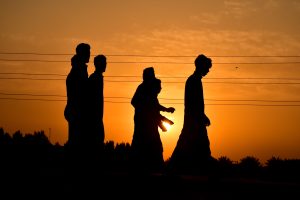by Sheikh Muhammed Salih Al-Munajjid
There are a number of symptoms of the illness of weak faith, including the following:
Falling into sin and committing Haraam deeds:
Falling into sin and committing Haraam deeds:
There are some sinners who commit a sin and persist in it, and some who commit many kinds of sin. When a person commits many sins, sin becomes a habit which he gets used to, and then he no longer feels that it is abhorrent. He gradually reaches a stage where he commits the sin openly, and thus becomes one of those referred to in the hadeeth: “All of my Ummah will be fine except for those who commit sin openly, an example of which is a man who does something at night, and when morning comes and Allaah has concealed his sin, he says, ‘O So-and-so, I did such and such yesterday.’ His Lord had covered his sin all night, but he has uncovered what Allaah had concealed.” (Reported by al-Bukhaari, Fath 10/486).
Feeling that one’s heart is hard and rough:
A man may feel that his heart has turned to stone which nothing can penetrate or reach. Allaah says (interpretation of the meaning): “Then, after that, your hearts were hardened and became as stones or even worse in hardness…” [al-Baqarah 2:74]. The person whose heart is hard will not be moved by reminders of death or by seeing deceased persons or funerals. He may even carry a dead person to his grave and throw earth into the grave, but when he walks between the graves it is as if he is merely walking between rocks.
Not doing acts of worship properly:
His mind wanders and he fails to concentrate properly when praying, reading Qur’aan, making Duaa, etc. He does not think about what he is saying, and he recites the words as the matter of boring habit, if he does these regularly at all. If he has the habit of praying a certain Duaa at certain times, according to the Sunnah, he does not think about the meaning of what he is saying, and Allaah “does not accept the Duaa of one whose heart is heedless of Him.” (Reported by al-Tirmidhi, no. 3479; al-Silsilah al-Saheehah,594).
Laziness and carelessness in performing acts of worship:
If he does them at all, they are just empty movements, devoid of any real feeling. Allaah has described the hypocrites thus (interpretation of the meaning): “… and when they stand up for prayer, they stand up with laziness…” [al-Nisa’ 4:142]. This also includes neglecting to make the most of special occasions and times for worship. This indicates that a person has no interest in earning reward, so he may delay going for Hajj although he is able to do so, or fail to go for jihaad when he has the strength to do so, or fail to attend prayers in congregation, or even Salat al-Jumu’ah. The Messenger of Allaah (peace and blessings of Allaah be upon him) said: “People will keep holding back from being in the first row (of congregational prayers), until Allaah throws them into the Fire.” (Reported by Abu Dawood, no. 679; Saheeh al-Targheeb, no. 510). This kind of person does not feel any remorse or guilt if he sleeps and misses one of the obligatory prayers, or a Sunnah prayer that is strongly encouraged, or a wird [regular Duaa and dhikr]. He does not want to make it up later, and he deliberately omits doing anything that is Sunnah or fard kifaayah (a duty which, if carried out by some of the people, is no longer obligatory on all, but if no-one does it, all are held accountable). So he may not attend Eid prayers (although some scholars say that they are obligatory), or offer the prayers to be said at the time of lunar and solar eclipses, or attend funerals. He does not care about reward at all, which is the opposite of the ideal described by Allaah in the Qur’aan (interpretation of the meaning): “… they used to hasten on to do good deeds, and they used to call on Us with hope and fear, and used to humble themselves before Us.” [al-Anbiya’ 21:90]


![[Your World Today] Who is in the worst position?](https://archives.radioislam.org.za/wp-content/uploads/et_temp/muhsin-ck-8BcNsqDJy2I-unsplash-1-225x300-9300_225x250.jpg)
![[Sabahul Muslim] Tawakul, Trusting in Allah’s Plan](https://archives.radioislam.org.za/wp-content/uploads/2022/07/Tawakul-on-Allah-is-the-source-of-relief-from-every-hardship-822x1024-1-400x250.jpg)

0 Comments